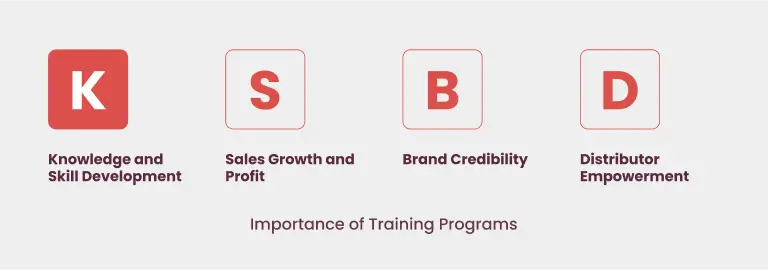Unlike many other business models, Multi-Level Marketing (MLM) is an innovative business type, designed to directly educate the customers comprehensively about the product and the business.
Hence the distributors are not just another group of talented salespeople but also people who are highly equipped with social skills and refined product knowledge.
To prepare the distributors with necessary skills, starting from the right motivation to an extended legal awareness which are necessary to navigate this unique business model, effective training methods are inevitable.
Table of Contents
Importance of Training Programs
Training programs are one of the investments in MLM businesses that can yield significant results for the company and its distributors:
- Knowledge and Skill Development:
- A typical training program starts with developing a business or marketing plan based on the product requirements. It teaches the distributors on how to answer the frequently asked questions from customers.
- Once they have the basic product and brand knowledge, the right motivation is set and reasonable and rational goals are set. They are also trained on leadership skills to navigate the uncertain field of the MLM industry. To achieve better proficiency in marketing, they are perfected in business or product presentation skills. The training covers basics of marketing and builds confidence in the distributors through role playing and training scripts.
- Efficient training sessions equip participants with in-depth product knowledge, exceptional customer service, and advanced sales techniques. This enables them to seek, find, and exploit business opportunities optimally, thereby building the brand image and ensuring long-term growth
- Sales Growth and Profit:
- A productive team of employees ensures efficient marketing, leading to increased sales, better customer relationships, and stronger business performance. The training programs must clarify ‘why’ the product is being sold in addition to what the product is about.
- Brand Credibility:
- Well-informed and well-equipped distributors who understand the MLM industry and its best practices are seen as authorities on product information and related matters by consumers. This not only builds brand trust and credibility but also increases dependability and customer retention rates.
- Support:
- Training should provide the roadmap to success for distributors in both their daily performance and long-term career prospects. They must be made adept in both personal and professional development. This gives them the right push for continuous improvement and growth. The availability of necessary resources and constant support minimizes errors and improves the confidence and performance of each distributor.
Challenges in Training Programs
Some of the often-encountered problems in MLM Business Training programs are:
- Misinformation: Oftentimes participants are misled about product claims and are encouraged to expect unrealistic benefits from joining the business. The false promises, exaggerated claims and dissent to criticism creates a cult-like atmosphere often leading to mass disappointment and churning within a short duration.
- Participants are not properly educated about the MLM Business model such as binary, unilevel, matrix or hybrid, and different aspects of it like the downline, compensation plans and different sales practices. The distributors come out of training with their rose-tinted glasses, massively ignoring the controversies, criticisms and challenges the industry faces.
Effective Training Practices
Let’s dive into the heart of this blog, in detail:
Targeted content:
- Requirement:
- Understanding the skill level and experience of distributors is essential to outline the content requirements. Drafting the training material content should take into consideration the learning styles and generational differences among the distributors.
- The distributors must be well trained on the unique-selling points, features and benefits of the product along with addressing the concerns, myths and misconceptions around any aspect of the business.
- Setting training modules based on realistic and clear expectations helps effective realization of the training vision.
- Versatile approach:
- Including a variety of engaging learning styles, from podcasts and video tutorials to in-person mentoring, ensures that the interests of various participants, depending on the wide and different demographics they come from, are duly accommodated.
- The method in which training is delivered impacts the distributor appeal and morale. Methods such as storytelling based on relatable experiences ensure proper understanding of the product benefits and business relevance.
Regulatory Training
- Legal and Ethical:
- Topics such as product claims, compensation plans, various consumer protection laws, and other regulations governing the product and the industry must be widely discussed and studied within the team. Training regarding the ethical and legal aspects of the business must be completed with due diligence.
Distributors must be made through on topics such as company’s policies, compensation plans, code of conduct and other mandatory rules that are expected to be followed.
- Topics such as product claims, compensation plans, various consumer protection laws, and other regulations governing the product and the industry must be widely discussed and studied within the team. Training regarding the ethical and legal aspects of the business must be completed with due diligence.
- Transparency and Integrity:
- Distributors must be trained in building trust through transparent, integral, and ethical business practices. This helps avoid any legal challenges that may arise and also builds the brand value and dependability.
Product Expertise
- Product knowledge:
- Distributors must be well-versed in all aspects of the product to address rational customer queries effectively like the renowned Diamond Club Training of Amway. This is also crucial for ethical business promotion and providing a reliable customer service experience. Distributors unaware of the product information erode customer appeal.
- Training tools:
- Product demonstrations, in-depth training manuals, interactive workshops, training resources, and in-person mentoring are methods through which distributors can be sufficiently trained about the product to carry out sales tasks confidently.
Marketing Techniques
- Sales skills:
- Effective sales techniques involve understanding sales psychology, efficient communication skills, developing a marketing presence, and employing methods such as prospecting techniques, presentation skills, and adapting successful marketing strategies. Distributors should be able to handle different tasks from identifying quality leads and filter the best prospects to monitoring their sales performance making the necessary adjustments.
- Approaching customers, persuading and closing the sales ethically, is the essential foundation to build the business and improve the revenues.
- Recruitments:
- To equip new recruits with the necessary skills to carry on the business, distributors must teach them to identify and educate prospects, present the business opportunity, and overcome objections and challenges that come along the way.
Mentorship
- Sessions:
- Distributors should be allocated a buddy-like program where mentors assist them with day-to-day queries such as the Nu Skin’s Velocity Success Training. Newcomers, especially, should be offered constant support, guidance, and motivation.
- The Key Performance Indicators of the distributors must be tracked to optimize the training process, identify new opportunities, and improve the productivity and performance along with keeping the team motivated.
- The Integrated MLM Software helps with tracking the KPIs for distributors. Book your free demo to understand how the detailed reports helps establish a consistent understanding of the distributor performance and its effects on sales indicators.
- Continual support:
- Availability of online support, forums, consistent training sessions, and webinars creates a space for continuous support, empowering distributors to foster a thriving work environment.
- The very foundation of networking is building healthy relationships. To ensure that, constant communication and collaboration must be enabled between team members through online forums, team meetings and quality discussions along with the obvious ranking through leaderboards.
- Distributors must also be trained and encouraged to accept and move on from rejection and challenges that come their way in their journey with the innovative Network Marketing industry. They must be armed with the right mindset and motivated to move the hardest of mountains through constant reassurance.
Technology
- Convenience:
- Availability of online modules, tutorials, forums, or social media groups enables participants to access guidance anytime, anywhere. This convenience gives them reliability and confidence in their day-to-day sales practices.
- Technology is also crucial in lead generation. Not training the distributors in the necessary skills to leverage the opportunities that social media and related platforms bring can do damage to your business model.
- Accessibility:
- The rigid old-school method of manual based training fails to capture the attention of the younger generation entering the business. Those methods are often outdated and leave the members feeling unheard, uninspired and ultimately, unproductive.
- The flexibility and accessibility that technology offers allows participants to learn at their own pace without compromising the quality or duration required for training. This also enables constant improvement and updating of training materials without the need to reprint them with every update.
- New methods of learning:
- Learning can be made a part of the daily routine through methods like podcasts, audio books, short videos, online community etc. Gamification of learning through online quizzes, questionnaires and leaderboards also boosts the learning motivation.
Tips for improvement
- Track the training programs and their results to identify areas that require attention and improvement.
- Gather feedback from distributors regarding aspects where they need further clarity and guidance.
- Regularly update the training program and sessions to integrate them with the best practices and knowledge required.
FAQ
What is an MLM Training Program
An MLM Training program is an educational session which incorporates in-depth learning of all the important aspects of the MLM Venture and the industry.
Why is training is important in MLM?
The MLM Business industry is often shoved through harsh criticism and mass misconceptions. Hence, proper education and understanding of the industry, the product and marketing techniques is crucial in building a market presence through the distributors and ensuring sustainable growth.
What is the main object of MLM Company?
The MLM business is based on trading or selling products through direct marketing based on a business structure of various levels.
Conclusion
Investment in training is an investment in the future of your MLM venture. There are numerous MLM software and applications available at different prices. But choosing the one that best suits your training requirements is crucial in building a thriving workforce.
By equipping distributors with the necessary skills, resources, and support they need, the overall growth of the organization is benefitted.
Remember, a well-trained distributor network is the lifeblood of any network marketing organization.






